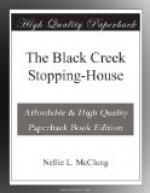(Reprinted by permission of The Globe, Toronto.)
Thomas Shouldice was displeased, sorely, bitterly displeased: in fact, he was downright mad, and being an Irish Orangeman, this means that he was ready to fight. You can imagine just how bitterly Mr. Shouldice was incensed when you hear that the Fourth of July had been celebrated with flourish of flags and blare of trumpets right under his very nose—in Canada—in British dominions!
The First of July, the day that should have been given up to “doin’s,” including the race for the greased pig, the three-legged race, and a ploughing match, had passed into obscurity, without so much as a pie-social; and it had rained that day, too, in torrents, just as if Nature herself did not care enough about the First to try to keep it dry.
The Fourth came in a glorious day, all sunshine and blue sky, with birds singing in every poplar bluff, and it was given such a celebration as Thomas had never seen since the “Twelfth” had been held in Souris. The American settlers who had been pouring into the Souris valley had—without so much as asking leave from the Government at Ottawa, the school trustees, or the oldest settler, who was Thomas himself—gone ahead and celebrated. Every American family had brought their own flagpole, in “joints,” with them, and on the Fourth immense banners of stars and stripes spread their folds in triumph on the breeze.
The celebration was held in a large grove just across the road from Thomas Shouldice’s little house; and to his inflamed patriotism, every firecracker that split the air, every cheer that rent the heavens, every blare of their smashing band music, seemed a direct challenge to King Edward himself, God bless him!
Mr. Shouldice worked all day at his hay-meadow, just to show them! He worked hard, too, never deigning a glance at their “carryin’s on,” just to let them know that he did not care two cents for their Fourth of July.
His first thought was to feign indifference, but when he saw the Wilsons, the Wrays, the Henrys, Canadian-bred and born, driving over to the enemy’s camp, with their Sunday clothes on and big boxes of provisions on the “doggery” of their buckboards, his indifference fled and was replaced by profanity. It comforted him a little when he reflected that not an Orangeman had gone. They were loyal sons and true, every one of them. These other ignorant Canadians might forget what they owed to the old flag, but the Orangemen—never.
Thomas’s rage against the Yankees was intensified when he saw Father O’Flynn walking across the plover slough. Then he was sure that the Americans and Catholics were in league against the British.
A mighty thought was conceived that day in the brain of Thomas Shouldice, late Worshipful Master of the Carleton Place Loyal Orange Lodge No. 23. They would celebrate the Twelfth, so they would; he’d like to see who would stop them. Someone would stand up for the flag that had braved a thousand years of battle and the breeze. He blew his nose noisily on his red handkerchief when he thought of this.




